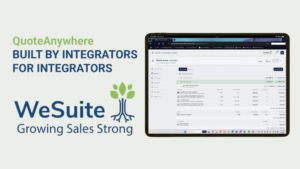Secrets to Sales Success: Leading Security Integrator, Securadyne
Shares How Industry-Specific Sales Management Software Helps it Thrive

Russell White & Erin McCauley

We spoke with Russell White, Allied Universal Security Tecnology’s Vice President of Technology and Innovation, and Erin McCauley, the company’s Hosted Managed Services Coordinator, to understand how the company is leveraging the capabilities of WeSuite’s industry-specific sales management software and what other security integrators can learn from their success.
Q: Thank you so much for taking the time to talk to us. Can you tell us about your company and what makes Securadyne Systems unique?
RW: Securadyne was created by the union of four terrific businesses from around the United States. Before our acquisition by Allied Universal in the spring of 2019, Securadyne ranked as the seventh largest security integrator in the U.S., with annual revenue of $70-80 billion. Many of our customers have deep industry knowledge; many have strict compliance requirements—for example, oil refineries or the electrical industry, which is highly regulated by the government to ensure the security of power grids and power plants. We also have government clients such as defense bases. Additionally, there are also enterprise customers across the nation that need a consistent standard of delivery. We have 17 branches on the East and Gulf coasts and a network of partners to deliver solutions to those customers for their critical, core compliance problems.
Q: What issues were you attempting to solve that first brought you together with WeSuite?
RW: Securadyne was originally using our ERP platform, SAP Business byDesign, for quoting, but because it’s a generic system, it couldn’t encompass the uniqueness of the security systems integration industry. For example, the system has to be able to handle everything from a $5,000 job to a $1 million job, and provide a mechanism for quoting labor accurately. The system just couldn’t cover everything we needed it to do. Securadyne also has a GSA contract, and we needed solutions that ensured we quote our GSA-eligible customers the published rates and prevent going below these thresholds with our market customers.
We began looking at WeSuite as an option quite a while back, prior to the time that Securadyne acquired security integrator IAS, the company that Erin had previously worked for, and it turns out that IAS had been a WeSuite customer. WeSuite had successfully developed an integration with IAS’s ERP system, SedonaOffice, which gave us confidence that we could work with them to do the same for our SAP system.
Q: Can you tell me the experience of getting the solution up and running and how the customization was handled?
RW: WeSuite developed an architecture and specification for both reading data from SAP Business byDesign and delivering “winning” job information to SAP Business byDesign. Through coordinated development work, both WeSuite and our SAP integration VAR developed the interface tables and things of that nature, for both inbound and outbound data for automation of the lead to sales process into SAP. Together, they did a lot of coordinated development, testing, then correcting any issues that came up. Things worked very well off the block—I’ve definitely worked with other interfaces where you spend more time making fixes than typing things in—so I can say that it exceeded my expectations. We achieved enough integration that we could share both ways, regarding customer information and parts, and were able to leverage the WeSuite toolset to meet the specific requirements of our industry and be able to scale up and down for the diverse sizes of our projects and the ability to create the documents for presentation purposes.
EM: We did a phased rollout. Our first launch was in spring 2015, first in Dallas and with the satellite offices in Houston and Austin. Then we followed up a few months later with Boston and their satellite office in Portland, Maine. From there we gradually took it companywide. Those first rollouts were really critical. We had a lot of support from the WeSuite team on the ground. Later, we were able to roll out the final locations ourselves. WeOpportunity and WeEstimate were included in the launch, along with several modules to help us with recurring monthly revenue, miscellaneous chargeable Items and automated approval workflows. We also included the Fixed Price Contract module, which was critical for supporting out need for GSA sales quoting.
Q: Which groups of employees are now using WeSuite?
EM: We have about 30 salespeople and 15 sales engineers—people who are in there, using the sales management software to build quotes on a daily basis. Our project managers and general or operations managers review and approve jobs before they are presented to the customers. Once projects are booked and exported out of the system into SAP, there’s a whole host of people who become involved, including the accounting team, making for a total of about 140 users throughout
the company.
We use WeEstimate approval structures for operation reviews on jobs above a certain dollar amount to make sure that we’re remaining profitable, efficient, and competitive. We’re also looking at implementing the WeSuite module that will allow us to securely send and legally sign digital documents using e-signature; this will help us to streamline our sales process even more.
Q: How are new employees trained and how quickly do they become proficient?
EM: Due to the size of our company, one-on-one training is difficult to conduct, but we provide a host of videos from WeSuite, which created a WeSuite Academy—aspects of which we’ve imported into our own online learning platform. This includes training videos on both WeOpportunity and WeEstimate. We also have several videos of our own, which train on the aspects that are customized and tailor-made for Securadyne. We also encourage peer-to-peer support.
WeOpportunity is quite intuitive, so with the videos and handouts that they receive, the salespeople can usually hit the ground running. WeEstimate is a little more complex. The speed that employees become confident using the software varies, partly depending on how they need to use it. Our goal is that by the end of their first month, they feel comfortable performing their main actions. I’d say that within 30 to 45 days everyone can easily do all key actions.
Q: What feedback have you received from Securadyne’s salespeople?
EM: That they find there is a lot of richness with WeEstimate and WeOpportunity because they are designed to work together. We also love the WeSuite Go! app that lets the salespeople create and work on leads, taking notes on the go. The text-to-talk feature lets them dictate their field notes while they’re between job sites or meetings, for example. That mobile ability is really important.
Q: What does management have to say about WeSuite?
RW: From a sales management perspective, we really value having one tool that we can use everywhere. If we make proposals to the same company but we do it from different offices, we know that they’ll look the same. To us, that’s a critical component. Also, we really appreciate the controls around approvals, so that we don’t have a salesperson send out a half-a-million dollar quote without an appropriate review. WeSuite takes care of all those pieces.
EM: For us, another sales management plus has been using the fixed-price contracts module for customer price specifics. We have some negotiated contracts with enterprise clients with an agreed upon margin for parts, as well as specific labor rates, so our salespeople who work with those customers are sure to assign adequate costs, regardless of the customer’s branch, and then apply the appropriate margin by selecting it from a dropdown list. It’s super easy for them, and that’s definitely been helpful.
Q: Speaking of enterprise clients, Securadyne handles enterprise-scale projects that must be complicated to quote, and where inaccurate quoting can be an expensive mistake. How has using WeSuite as a sales management software solution helped to better serve these customers?
EM: Enterprise clients want to see how costs breakdown across a project. WeEstimate has a folder structure, so our users can create folders for parts, labor, chargeable items, and RMR into those folders. There is a document editor that pivots in different ways to show or not show information depending on what kind of presentation you’re trying to give your customer. We have some customers who want to see every single thing and we have some who want to see just a little. Our sales people can change what’s presented simply by checking different boxes. That’s incredibly powerful.
As for chargeable items, our customized system asks salespeople whether they’ve included miscellaneous items like travel, permits and subcontractor fees. We’ve also worked with our solution architecture team to put in some other checkboxes so that we can keep things even tighter within the system. Many salespeople have said that they forgot these items until the system reminded them.
Q: How responsive is WeSuite’s support staff?
EM: Very, and I really like their web interface for support. Their ticketing system is easy to work with. I really appreciate that.
Q: How is the introduction of new features and updates to the software handled?
EM: For new feature roll-out, we have a sandbox. We do rigorous testing there, and we have a couple of power users who we often ask to jump in and test as well. Typically, once it’s passed sandbox testing, it goes to production and is pushed live to everybody all at once. With the sandbox, we have control of when we want to push things out. WeSuite introduced a feature—a deployment environment called Octopus—that is amazing. It allows us to schedule those updates on our own.
If the update involves a critically different operation from what our users have been doing, then we follow the launch with some written training as well as a live review. Typically, once we do an update, I send out an e-mail that highlights key bug fixes or new features based upon the release notes provided by WeSuite.
Q: Have you been satisfied with the software’s ability to keep up with your changing needs?
EM: WeSuite introduces updates and enhancements frequently and constantly makes adjustments in response to support and development needs.
RW: Generally, our needs don’t surprise WeSuite a lot. They know the industry well and get enough customer feedback to anticipate what we’re going to need. That’s a real positive.
Q: Why should other systems integrators use WeSuite?
RW: The reason to use WeSuite is that they’re an industry-specific solution. They understand our business and where we’re going. They take our feedback to develop tools that will benefit our organization. You could trade this for something that’s more universally known, but then you would have to fight for the industry-specific things that you need. If we’re having struggles or issues, we know we can always reach out and we will be helped. We will get exactly what we need from WeSuite.
Other stories

WeSuite Expands Its QuoteAnywhere to a Full-Featured Stand-Alone Sales Platform
WeSuite, a manufacturer of award-winning sales management software for security technology sales and service providers, is excited to announce the expansion of its web-based sales software, QuoteAnywhere, to a full-featured, stand-alone, lead-to-close sales platform.

WeSuite President Tracy Larson Inducted into Security Sales & Integrations Industry Hall of Fame
WeSuite, a manufacturer of award-winning sales management software for security technology sales and service providers, announced today that Tracy Larson, WeSuite President and Co-Founder, has been inducted into the Security Sales & Integration’s Industry Hall of Fame.

Are You Getting the Most Out of Your CRM? Start by Asking these 5 Simple Questions
Your sales pipeline is your lifeline. It tells you where your deals stand, where your time should go, and how close you are to hitting your number. And your CRM? It’s the tool that keeps your pipeline in check.

Is There a Secret to Closing Security Sales Faster? Here Are Seven!
Pushy, high-pressure sales tactics turn off buyers – we’ve all been there! Fortunately, you can increase your on-the-spot close ratio by being buyer and solution oriented with sales automation software like QuoteAnywhere from WeSuite to support your sales efforts.
